As we navigate the aging of our loved ones, new challenges inevitably arise—especially when communication becomes tough. Whether it's your parent, grandparent, or someone you care for, finding ways to connect when words fail can be frustrating and heartbreaking. And let's face it, when your loved one can't speak, you might feel powerless. But with a little know-how and a lot of compassion, there are ways to bridge the gap and keep those connections strong.
At 4 Seasons Home Care, we understand that it's about more than just physical care. Our non-franchised, family-oriented approach means we're not tied to cookie-cutter solutions. Instead, we focus on your family and their unique needs. Whether it's personal care, memory care, or companion care, we make sure that each of our clients feels understood—whether they're able to speak or not.

Why Some Seniors Can't Speak
There's a whole host of reasons why your aging parent or loved one may have difficulty speaking. Often, it's tied to specific health conditions, each bringing its own communication hurdles. Here's a quick rundown of some of the most common:
Aphasia
Often caused by a stroke, aphasia is a frustrating condition that makes it difficult for people to express or understand language. Imagine wanting to ask for a cup of coffee but not being able to form the words or comprehend the question, "Do you want coffee?"—pretty tough, right? This is where understanding and patience come in.
At 4 Seasons Home Care, our caregivers are trained in recognizing and responding to these struggles. Instead of rushing or overwhelming seniors, we slow down the conversation and look for ways to help them express themselves—whether through gestures, visual aids, or even simple yes/no questions. It's not about doing things for them, but doing things with them.
Parkinson's Disease
For seniors with Parkinson's, communication issues often go unnoticed. They might be thinking clearly but speaking with a soft or breathy voice, something they may not even realize. This condition, called hypophonia, can be tricky to navigate because it's not about the mind but the mechanics of speaking.
Our caregivers at 4 Seasons don't just focus on what's being said; they pay close attention to how it's being said. And, when necessary, they adapt their communication style—perhaps by simplifying questions or using more visual cues to support the conversation.
Brain Injuries or Trauma
Traumatic brain injuries (TBIs) are an unfortunate reality for many aging adults. They can result in a range of speech issues, from slurred speech (dysarthria) to difficulty coordinating the movements needed to speak (apraxia). For someone dealing with this, it's like their body has forgotten how to speak properly, even though their brain knows what to say.
Our caregivers don't just provide assistance—they're there for the long haul, walking with seniors on their journey to recovery. Whether it's helping them with speech exercises from their therapist or just making communication a little easier with tools like tablets and picture boards, we're committed to ensuring their voice is heard—even if it's not through words.
Dementia and Alzheimer's
Dementia and Alzheimer's can make communication unpredictable. One day, your loved one might be able to hold a full conversation, and the next, they may struggle to form a single sentence. This can be incredibly challenging for family members.
Our caregivers are trained to recognize the signs of these memory conditions and adjust their communication style accordingly. Sometimes it's about breaking down tasks into simple, manageable steps, and other times, it's about understanding that silence is okay. Being present with your loved one—no matter how much or little they can say—can still be meaningful.
How to Communicate When Words Fail
Now that we've covered the "why," let's dive into the "how." What can you, as a caregiver or family member, do when your loved one can't find the words?
1. Get Visual
A picture is worth a thousand words. Using visual aids, like pointing to objects or using picture boards, can help seniors communicate more easily. Even body language can be a powerful tool when words aren't there.
2. Slow It Down
One of the biggest things we teach our caregivers at 4 Seasons Home Care is to slow down. Seniors often need extra time to process what's being said. Rushing them or finishing their sentences for them can make them feel disempowered or frustrated. Give them the space they need to communicate at their own pace.
3. Respect Their Dignity
This can't be overstated. Speaking for someone—or worse, treating them like a child—can strip away their dignity. At 4 Seasons, we treat every senior like the capable adult they are. They might need assistance, but that doesn't mean they're helpless. Respecting their autonomy, even when communication is tough, goes a long way in building trust and maintaining their dignity.
4. Be Flexible
Sometimes, even the best-laid communication plans don't work. And that's okay. Being adaptable and open to using different methods—whether that's technology, written notes, or non-verbal communication—ensures you can still connect with your loved one, no matter what challenges arise.
How 4 Seasons Home Care Stands Out
At 4 Seasons, we're not just about getting the job done. We're about doing it well. Our caregivers aren't bound by franchise rules or rigid systems—they're free to tailor their care to meet the specific needs of your family. That means more than just knowing how to help someone with aphasia or Parkinson's. It means understanding them as a person, respecting their individuality, and fostering an environment where communication—however it happens—feels natural and supported.
Ready to Take the Next Step?
Whether you're a caregiver looking for help for your aging parent, or you're a senior trying to figure out the best care for yourself, we've got your back. 4 Seasons Home Care offers consultations where we can discuss your unique needs and explore how our team can provide the personalized, compassionate care your family deserves.
Reach out today and let's start the conversation—no pressure, just a chat to see how we can help!
